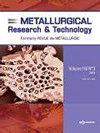Thermodynamics and mechanisms of silver tailings roasting processes
IF 1.1
4区 材料科学
Q3 METALLURGY & METALLURGICAL ENGINEERING
引用次数: 1
Abstract
To separate and extract all the useful components of tailings, taking silver tailings as the object, the thermodynamics of silver tailings during the roasting processes was investigated, and the phases transformation mechanism of major minerals were obtained. Based on the mineralogy characteristics of silver tailings, the standard Gibbs free energy changes for the chemical reactions in the roasting processes were calculated; the thermal chemical behaviors and the mineral phases transformation were investigated using TG/DTG-DSC and XRD; and the microstructure changes with chemical composition of microregions were characterized through SEM-EDS. The thermochemical reaction characteristics for the roasting activation of tailings and sodium carbonate at different temperatures were as follows: at 450–650 °C, the ankerite, siderite and sulfide in tailings were oxidized and decomposed, while the crystal transformation of quartz and chlorite occurred; at 650–750 °C, quartz, muscovite and chlorite decomposed to form soluble sodium silicate, sodium aluminum silicate, diopside, sodium ferrite and copper ferrite etc; at 750–800 °C, due to the increase in products with low melting point, the roasted samples melted. During the roasting processes, the surface of minerals depressed and the structures were destroyed. These results can provide a theoretical foundation for thoroughly resource utilization of tailings.银尾矿焙烧过程热力学及机理研究
为分离提取尾矿中所有有用组分,以银尾矿为对象,对银尾矿在焙烧过程中的热力学进行了研究,获得了主要矿物的相变机理。根据银尾矿的矿物学特征,计算了焙烧过程中化学反应的标准吉布斯自由能变化;采用TG/DTG-DSC和XRD研究了其热化学行为和矿物相转变;通过扫描电子能谱仪(SEM-EDS)表征了微区化学成分对微观结构的影响。不同温度下尾矿与碳酸钠焙烧活化的热化学反应特征为:在450 ~ 650℃时,尾矿中的铁白云石、菱铁矿和硫化物发生氧化分解,石英和绿泥石发生结晶转变;在650-750℃下,石英、白云母和绿泥石分解形成可溶的水玻璃钠、硅酸铝钠、透辉石、铁氧体钠和铁氧体铜等;在750-800℃时,由于低熔点产品的增加,焙烧样品熔化。在焙烧过程中,矿物表面凹陷,结构被破坏。研究结果可为尾矿资源化的彻底利用提供理论依据。
本文章由计算机程序翻译,如有差异,请以英文原文为准。
求助全文
约1分钟内获得全文
求助全文
来源期刊

Metallurgical Research & Technology
METALLURGY & METALLURGICAL ENGINEERING-
CiteScore
1.70
自引率
9.10%
发文量
65
审稿时长
4.4 months
期刊介绍:
Metallurgical Research and Technology (MRT) is a peer-reviewed bi-monthly journal publishing original high-quality research papers in areas ranging from process metallurgy to metal product properties and applications of ferrous and non-ferrous metals and alloys, including light-metals. It covers also the materials involved in the metal processing as ores, refractories and slags.
The journal is listed in the citation index Web of Science and has an Impact Factor.
It is highly concerned by the technological innovation as a support of the metallurgical industry at a time when it has to tackle severe challenges like energy, raw materials, sustainability, environment... Strengthening and enhancing the dialogue between science and industry is at the heart of the scope of MRT. This is why it welcomes manuscripts focusing on industrial practice, as well as basic metallurgical knowledge or review articles.
 求助内容:
求助内容: 应助结果提醒方式:
应助结果提醒方式:


